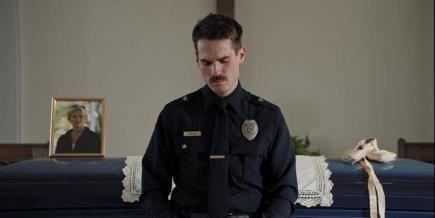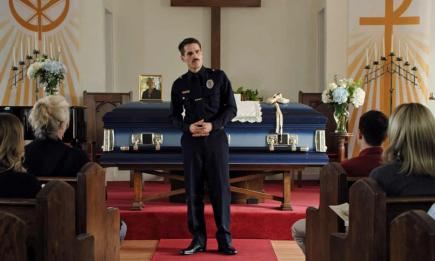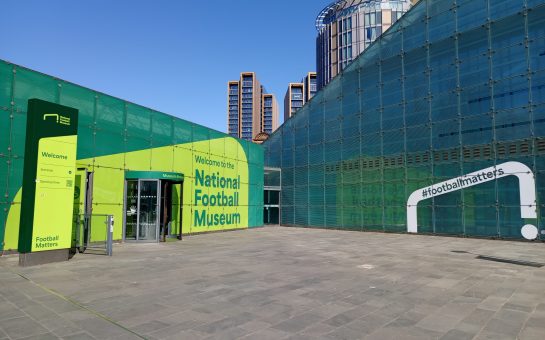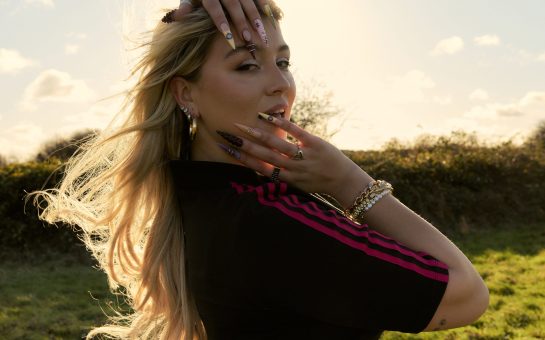Thunder Road has shown everywhere from Cannes to Kansas over the past year, and now it is finally getting a UK release.
The tragicomedy starts with police officer Jim Arnaud (Jim Cummings) at his mother’s funeral, a gruelling long take follows him as his speech falls apart, in equal parts hilarious and tragic.
The following 80 minutes track Jim as he tries to get his life back on track and reconnect with his daughter.
Cummings wrote, directed, edited and stars in the film, which is based on his award winning short of the same name. MM spoke with Jim prior to a preview screening at HOME, Manchester.
Thunder Road, the song, features in the short but not the feature, why?
It was artistic. We shot the opening scene two different ways, we shot nine takes with the song as it is in the short film and nine takes without the song. Then when we were in the editing room the performance was so much better in the later takes. And our producers were like yeah let’s not screw with Bruce Springsteen again, let’s just f*cking make the movie without Thunder Road.
Narratively as well it worked, when we had a cut of the feature with the song in it it felt like it was too cathartic, like it was working too well. Then without the song it just become this horrible nosedive into performance art and I think that’s kinda needed, it was just working as an equation over 90 minutes better without the song.
So did you have trouble with the short with Springsteen?
We thought that we would but it was fine. We submitted to Sundance without the rights, we won Sundance without the rights and then we were like: ‘Well shit what are we going to do now? We can’t put it online’. So I reached out to his management company, he was doing a world tour so he was very busy.
But they watched the short film and they were like ‘yeah that’s really good, thanks for sharing’ and I was like ‘No, I need the rights, I wanna put it online for free’. And then eventually I just wrote a letter to him and they said ‘give us a thousand dollars and have it online for a year’.
So we put it on Vimeo and we asked them every year where we could send the thousand dollars and they just said it was fine and became supporters. He’s seen the feature, he saw it in January with his whole family and really dug it. People become timid in the art world of just doing it, you can kind of do whatever you want.
Are you a big Springsteen fan?
I am, and I definitely wrote it as a love letter to his stuff, I grew up listening to his music, my mom is a huge fan of his. But now I feel I can’t listen to the song, I listen to it once every year maybe and I have different meanings to it. I’m a huge fan of his and he’s been nothing but nice to us.
What’s your background in filmmaking? How did you get to making the short film and then the feature?
I was a producer for seven years, working on other peoples projects. I was working with a couple of directors who’d had viral videos and small features films. I had produced about five or six features, and countless commercials and sketch comedy. Kind of stupid stuff that didn’t really connect with audiences.
Then I was an associate producer on a film called Krisha, that was shot in Texas, that was this beautiful film that was shot for like $30,000 in a backyard. The director shot the movie in a bathrobe with flip flops. He was just such a normal dude and that kind of woke me up that you don’t have to be Steven Spielberg or David Fincher to make movies – if this guy can make a movie I can definitely make a movie.

Then I was producing for College Humor for seven to eight months making around three sketches a week. And I thought well sh*t, what it would take for me to organise something of my own.
I feel like I’m bringing in all these crews and cinematographers, if I can just ask one of them to come out for a day and pay them a day rate I could make something of my own and then that became Thunder Road.
I had no aspirations of it getting into Sundance, I thought at best this could be the Vimeo staff pick short and that would be really cool. But it won Sundance and started my career as a writer and director which is super weird.
Krisha, would you say that was the catalyst to you going your own way?
For sure, I saw it at SXSW in 2015, I’m not a religious person but I had that kind of experience of ‘this is the future of making movies’, at least for me. In America I saw it as this revolutionary movie where it was doing things to the audience that was well crafted and organised and thoughtful and still very impressive on an extremely small budget. I just loved it, I was like okay cool this is what I wanna do for the rest of my life.
Did your experiences as a producer and working for College Humor help you on the set of Thunder Road?
Being a producer definitely informed my ability of writing for stuff that we can actually shoot, instead of writing space operas. We always wrote stuff that we could shoot in the backyard with the cameras and the teams and the actors who we knew.
Then at College Humor the thing that really inspired me was not really having any creative input. Working on stuff that was just terrible and not funny at times, so I was like ‘well f*ck it I’m gonna make something that’s actually funny.’ After months and months that really wore down on me so I kind of had to do something, and that become ambition.
So it was about connecting to audiences as well?
Yeah that’s the most important thing, right? The job of a filmmaker is to make the audience care, and I feel like I was watching a lot of movies and the craftsmanship of the cinema, there was no cinema to it. You go into a movie theatre and there was no ci-ne-ma at the cinema.
They didn’t use the camera to help tell the story and that’s become an epidemic these days. The fact that our little f*cking movie that we made in a backyard for nothing is playing in cinemas here is a good sign that the system isn’t working for audiences right now.
How did you go to making the leap from the short film to the feature?
It was brutal. I had rested on those laurels, literally Sundance laurels, I thought that for whatever reason that was going to help us do anything else. But it really only helped us to make more short form content, so I spent a year and a half shooting nine more single take short films for different companies that wanted to help out.
I wrote and directed these things and it was great education, it was more long takes and working with different actors. That was really helpful to build the team of juggernauts that I had, but it never helped us to get financing.
I met up with the people who turned Whiplash into a feature and they were like we kind of want nothing to do with it, unless it’s Jake Gyllenhaal acting in it we don’t really wanna do it. Literally we got zero dollars and zero people knocking on our door to make the Thunder Road feature to a point where it was seven or eight months later and I was like alright sh*t, I’m just going to do it myself. A hundred people told us no but the crew and my producers said yes and that was all I needed.
Where did the inspiration for the story come from?
I was in a hot tub with a buddy of mine and he told me a story about a friend of his who sang at a funeral. I was like that’s such an interesting thing to do, I forget that people sing at funerals, the favourite songs of the deceased. That’s a weird thing to do, because if you’re grieving you’re not thinking about how to deliver a song well.
That would be really funny to watch somebody’s voice crack while they’re singing a famous song. That was just in the back of my mind as an interesting monologue idea for an actor, I wasn’t an actor at the time, I’m still not. I thought about it for a long time and then I was in the car a week later coming back from a party at work and it was a 45 minute drive back and Thunder Road came on the radio.

I was thinking about my mom and I thought I’d portably sing this if my mom died, and it would be great if I f*cked it up and that could be really funny and tragic and I’d never seen that. I love Pixar movies and how they make you laugh and cry at the same time and thought this could be a really interesting thing to do.
I had this idea for the short film. We shot it in six hours in a funeral home in California and that became the short. It was just supposed to be this tiny funny short video, I wanted to show off my abilities for and then it became something so much bigger.
Why is Jim Arnaud, the protagonist, a policeman?
I knew it had to be a tough guy, like a cowboy kind of dude. And I knew I had to make him Southern because that was just so much more pathetic and harder to admit that you have problems in the south when you’re in this masculine tribe.
It was late 2015 when I was writing it and it was the height of the Black Lives Matter movement and you couldn’t get on social media without having a conversation about police brutality and I wanted to make something that would be equally humiliating and humanising of this character. It had to be cop, I think.
How has the film got to where it is now?
Vertigo is releasing it in the UK and they’re very lovely. We got in contact with them after Cannes and they said yes we want this film. We did the same thing in Canada and France. It came out first in France, before the United States which is rare for a movie to come out in another territory before its domestic territory. But that was because they were so quick to want to release it immediately after Cannes.
I think the only thing thats different about our story is that we didn’t have a sales agent, we didn’t have a distribution company that bought global rights, we just did it ourselves.
My buddy Dan, who’s my producer said I think I can try this and just on his laptop and cell phone started reaching out to people, and I think distributors around the world were keen to talk to us because we were the actual artists, this wasn’t a sales company with a rolodex of movies they don’t really give a sh*t about. It was like ‘oh no these were the people who actually sweated in hot cars making this movie.’
So we’re able to get the film out to a bunch of countries and it’s had this weird global success that I’m not sure would be the case if we sold the global rights to A24 or Neon or somebody like that. I love those people but they release 25 films a year and ours might have been buried, we were the people who cared the most about the movie. I say that to all of these upcoming filmmakers, that no matter what, you are the person who cares the most about your future and your movies and to act accordingly.
With filming and doing everything yourself, were there any particularly tough moments on set?
I lost my voice shouting in the parking lot, because I went to full volume on the take that’s in the movie, the second take we got we couldn’t use because my voice was so raspy. Then I had to go and shoot the scene at the dinner table, I almost had to dub some of my dialogue because my voice was so raspy.
I feel like those were the biggest hiccups. I cut my artery open in my arm when I was breaking into the car and had to superglue it shut. I really messed up my arm falling off of the fence, we did that about eight times. Other than that I was fine, a couple of cuts and bruises.
You’ve travelled all over with this film, you’ve won awards, I saw Rian Johnson tweeted about it the other day, what’s been the best bit about the whole journey of this film?
I hate to say it but being taken seriously. For many independent filmmakers it can be a terribly lonely experience. You’re doing it late at night, working a day job trying to make this dream come true for you and your crew and your friends. The fact that we all carried heavy equipment up flights of stairs in Austin, Texas for 14 days and then got to wear tuxedos in the south of France and London. I think that’s probably up with the best part about it.
Who are your biggest inspirations in film?
Alfonso Cuaron, I really like Children of Men, that’s a movie I saw at cinemas and I’d never seen anything like it and it was so good to see it work. Long takes, focusing on comedy and drama and high stakes and human performances. That was a big one for me.
Early Spielberg, George Lucas, Jackie Chan. Jackie Chan has been a huge influence comedically.
Tell me something you’ve never told anyone before.
I was really unambitious for a long time. Most people see me as this industrious do-it-yourself kinda guy but I was a really lazy nobody for a long time. Then as soon as lightning struck, as soon as I had the idea for the Thunder Road short, I said this is gonna be really good and I think my personality changed a great deal.
Thunder Road is out in UK cinemas today.



